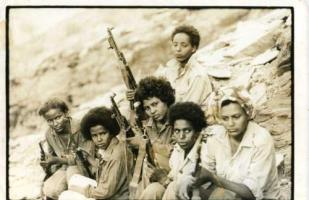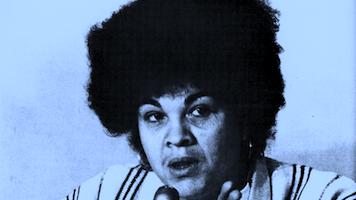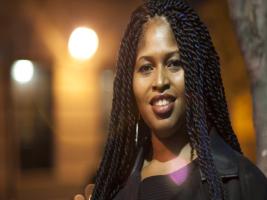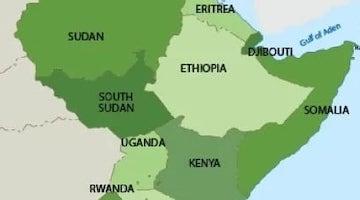BAR Book Forum: Erica R. Edwards’ “The Other Side of Terror”
In this series, we ask acclaimed authors to answer five questions about their book. This week’s featured author is Erica R. Edwards. Edwards is Associate Professor of English and Presidential Term Chair in African American Literature at Rutgers University. Her book is The Other Side of Terror: Black Women and the Culture of US Empire.
Roberto Sirvent: How can your book help BAR readers understand the current political and social climate?
Erica R. Edwards: The Other Side of Terror is at its heart a cultural history of the present, a cultural history of what I call the long war on terror.
When I started this book I set out to study all of the things that representations, fantasies, stories, and demonizations of Black women do for imperial US culture, that is, for all of the forms—film, music, literature, news culture—that project this country’s global corporate and military might. It tracks significant shifts in power over the course of the late twentieth and early twenty-first centuries, allowing us to see how proliferating forms of difference—racial, gender, sexual—are essential to the millennial narratives of multicultural democratic righteousness that actually provided cover for hypercarceral, hypersurveillant, hypermilitarist governance throughout the post-1968 period. But I also wanted to study the way Black feminist writers took over those very forms to expose the contradictions of contemporary governance and representation.
What do you hope activists and community organizers will take away from reading your book?
I hope that activists and organizers are inspired by the stories I tell here, but I also hope they gain a clearer understanding of the ways power operates through the inclusion, solicitation, and glamorization of Black women. I like to say this is a story of power at its most devious, but it is also a story of black feminist radicalism at its most trenchant. Black feminist expressive culture has taken as one of its central motives deciphering the tracks between anti-Black terror and the operations of late- and post–Cold War counterinsurgency, which have increasingly depended on Black loyalty to country, Black statecraft, what Gwendolyn Brooks decades ago referred to sneeringly as the “government men” with pretty brown faces, to spread the fiction of democracy around the world, in sentences of justification and with actual weapons of war.
I show how Black women writers, who have been on the edge between a multiculturalism-oriented literary industry that promotes their writing as a way to ethically encounter difference and the radical social movements—and radical literary movements—that were offering up alternatives to that political-market logic, predicted the monumental post-1968 transformation of governance and crafted ways of surviving it. I am most inspired by what we learn from June Jordan, Toni Cade Bambara, Danielle Evans, Nikky Finney and others about the moment we’re surviving now.
We know readers will learn a lot from your book, but what do you hope readers will un-learn? In other words, is there a particular ideology you’re hoping to dismantle?
I center Black feminist theories of power in my attempt to account for the domestic and foreign iterations of US imperialism. I ask us to question the way we instrumentalize Black women’s cultural labor. What does it mean that even when Black women’s writing is at its most radical—making important connections between domestic policing and counterinsurgency in 1980s Central America, for example, or exposing how the Manichaean narratives of what was called the War on Terror drew upon new imaginaries of Black femininity and Black familial intimacy—it is either cycled into stories of race betrayal, with Black women being blamed for airing Black folks’ dirty laundry, or prized for its pedagogical function of instructing the nation in how to heal from the trauma of slavery?
I hope I make Black women’s writing harder.
And, relatedly, considering the intimacy between Black cultural forms and the national and global projects of counterinsurgency, I hope this book causes us to temper some of the claims we make about contemporary Black culture.
Who are the intellectual heroes that inspire your work?
There are too many people I think and write and dream with to name here! But this work was inspired by the Black feminist critics and literary theorists—Mary Helen Washington, Gloria Wade-Gayles, Cheryl Wall, Deborah McDowell, Barbara Christian, Barbara Smith, Saidiya Hartman, Hortense Spillers, Sylvia Wynter, Wahneema Lubiano, Hazel Carby, Nellie McKay, Ann DuCille, and so many others—who have been theorizing and refusing power’s seductive, incorporative moves as they have been taking shape over the post-60s decades. It should also become clear to readers of the book the intellectual debt I owe—will always owe, will never be able to make good on—to June Jordan, Toni Cade Bambara, Angela Davis, Gloria Naylor, Alexis Pauline Gumbs, Ntozake Shange, and so many other radical Black feminist creative writers.
In what way does your book help us imagine new worlds?
The point I return to throughout the book is that as much as Blackness has served the US’s narratives of official, militarized protection it has also continued to function as the radical ground for imagining a kind of social life that refuses the imposition of militarized security as the necessary precondition of human being-together. This a dynamic—of contradiction, of unbreachable impasse—that Black feminist literary culture has exposed since 1968. If it was the glorification and performance of Black heteropatriarchy that smoothed the incorporation of Blackness into the signs of empire and, in turn, lubricated discourses of US exceptionalism, Black feminists have long honed a collective critique of what Candice Jenkins calls “the salvific wish,” not only because they/we had to create models of intimacy that better suited Black women’s needs and realities but also because that critique would prove essential in understanding and refusing the invitations of US empire. Their/our inventions, then, give us a collection of communication practices to imagine and bring into being a world without militarized and carceral safety.
Roberto Sirvent is editor of the Black Agenda Report Book Forum.



















